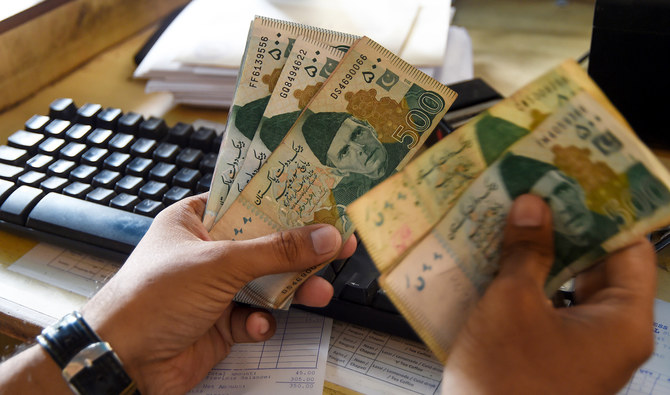KARACHI: Pakistan’s rupee continued to gain against the US dollar on Thursday, appreciating by 0.13% as the market reacted to “positive vibes” from the International Monetary Fund (IMF) and increase in forex reserves in the wake of the inflows from China, currency dealers and analysts said.
The rupee increased in value against the dollar by Rs0.27 before closing at Rs204.85 in the interbank market.
Pakistan’s national currency has taken a battering during the outgoing fiscal year 2021-22, losing its value by a whopping 30% and touching an all-time low of Rs211.93 against the US dollar on June 22, according to the central bank’s data.
Pakistan’s fast-depleting foreign exchange reserves, a huge import bill and delay in the revival of a $6 billion loan from the IMF have caused the rupee to rapidly depreciate over the past few weeks.
On Tuesday, Pakistan received a Memorandum of Economic and Financial Policies (MEFP) from the IMF for the combined 7th and 8th reviews, the development being considered an important one for the resumption of the loan facility.
“Since positive vibes are coming from the IMF front, the rupee is constantly gaining value against the dollar,” Zafar Paracha, senior currency analyst, told Arab News.
“Today, it was trading at Rs203.50 and was expected to close at Rs203,” he continued. “However, the demand pushed the value of the rupee toward the lower side by the end of the day.”
Paracha said after the recent development on the IMF front, the business sentiment had changed and a downward trend in the value of dollar had been observed in the market.
“Besides, exporters are also selling their dollars in the market while importers are holding back due to currency fluctuations,” he noted, explaining that the demand for the dollar was slow and the supply was high, which was causing the rupee to appreciate.
Pakistan’s foreign exchange reserves increased last week when China deposited RMB15 billion (roughly $2.3 billion) into Pakistan’s central bank, a few days after some Chinese banks signed a loan agreement with Pakistan.
Inflows from China and progress in Islamabad’s talks with the IMF had caused the rupee to gain strength, currency dealers said.
“The government has played a key role in its talks with the IMF and it is expected that the authorities will sign an agreement with the fund in July 2022,” Malik Bostan, president of the Forex Association of Pakistan, told Arab News, adding that inflows of $2.3 billion from China had also contributed to the appreciation of the Pakistani rupee.
Bostan said reports of former finance minister Ishaq Dar’s arrival in Pakistan next month had also changed the market sentiment and induced exporters to sell their dollars.
“Dar is known for keeping the dollar in check, so exporters have started selling their dollar holdings,” he added. “Due to this, dollar sales have increased by around 30%.”
Dealers and analysts said the country was expected to receive financial support from friendly countries such as Saudi Arabia and other donors after the completion of the IMF review.
However, they warned against political uncertainty in the country and its adverse impact on Pakistan’s economy and currency.














